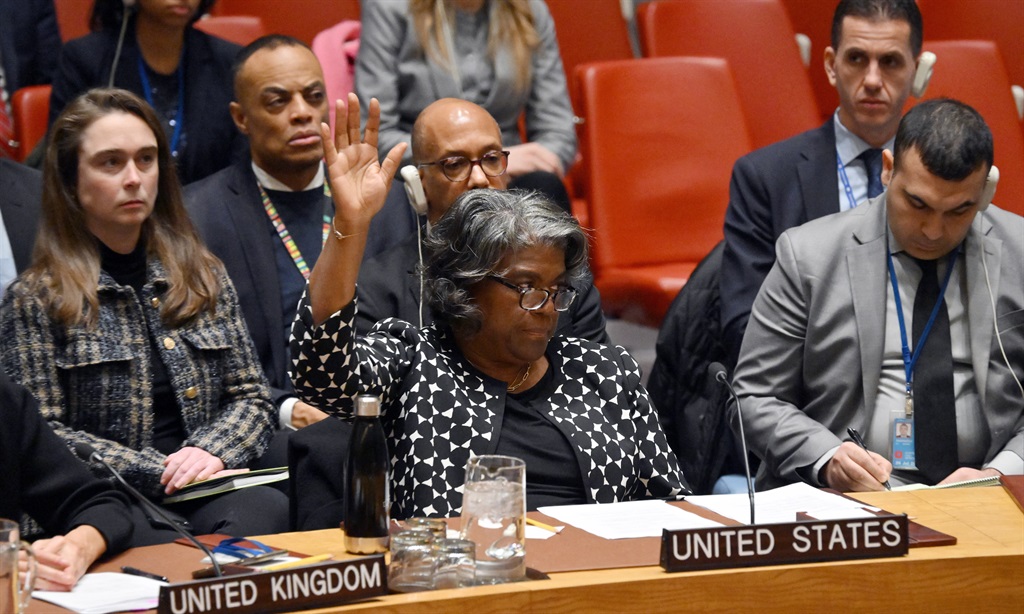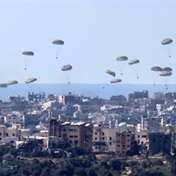
- US President Joe Biden is calling for a temporary ceasefire in the ongoing conflict between Israel and Hamas in Gaza.
- The US has vetoed three draft UN Security Council resolutions on the Israel-Hamas war, but now proposed its own draft resolution using the word "ceasefire".
- Biden's apparent shift in rhetoric towards the need for a ceasefire may reflect his administration's concern over a potential Israeli offensive in Rafah, the southern Gaza city where more than a million Palestinians have sought refuge.
US President Joe Biden spent months wanting a "pause" in the fighting between Israel and Hamas in Gaza. But with Israel preparing for a ground offensive in Rafah, his rhetoric is shifting to emphasise the need for a "temporary ceasefire".
It sounds like a slight rhetorical difference, but it is one that inches Biden closer to many around the world and to critics within his own Democratic Party who want a permanent ceasefire to a war in which nearly 30 000 Palestinians have been killed.
The US has vetoed three draft UN Security Council resolutions on the Israel-Hamas war. The most recent two vetoes blocked language demanding an immediate humanitarian ceasefire. But Washington has now proposed its own draft resolution enshrining the word "ceasefire".
The draft calls for a temporary ceasefire in the Israel-Hamas war linked to the release of hostages held by Hamas and opposes a major ground offensive by its ally Israel in Rafah, according to the text seen by Reuters.
US ambassador to the United Nations Linda Thomas-Greenfield denied any intentional shift in language.
DEVELOPING | 'Irresponsible': US vetoes UN Security Council push for Gaza ceasefire
"It reflects what we've been doing all along," she told reporters on Tuesday.
Until the draft proposal, Washington had avoided the word ceasefire in relation to any UN action on the Israel-Hamas war. The new US text echoes language that Biden used publicly this month about the situation.
"I'm pushing very hard now to deal with this hostage cease-fire because, as you know, I've been working tirelessly in this deal," Biden told reporters at the White House on 8 February, as he called Israel's response in Gaza "over the top," his sharpest critique to date.
Eight days later he said he'd held extensive talks with Netanyahu on the topic of a ceasefire.
"I've made the case - and I feel very strongly about it - that there has to be a temporary ceasefire to get the prisoners out, to get the hostages out. And that is under way. I'm still hopeful that that can be done," Biden said on 16 February.
This compares to his mention of a "pause" when a previous hostage deal was negotiated in November.
"I'd like to see the pause go on as long as prisoners kept coming out," he said on 26 November.
US officials said Biden's change in language has nothing to do with his critics.
Instead, they said, it is reflective of the intense efforts to negotiate a deal between Israel and Hamas to halt the fighting for six to eight weeks in exchange for the release of hostages held in Gaza and speed the delivery of humanitarian aid to civilians.
READ | Israel is apartheid South Africa but worse, Palestine tells ICJ
The thinking within the White House is that if fighting can be stopped for that long, an even longer ceasefire could emerge. But a planned Israeli offensive in Rafah, the southern Gaza city where more than a million Palestinians have sought refuge, would complicate efforts toward a halt in the fighting.
US officials insist that Biden is not calling for a permanent ceasefire, a reflection of his gut feeling that Israel has the right to defend itself after Hamas militants killed 1 200 people in southern Israel on 7 October.
Aaron David Miller, a senior fellow for the Carnegie Endowment for International Peace and a Middle East expert, said Biden's shift in rhetoric did not reflect a major change but did reflect the administration's concern over a potential Rafah offensive.
Arab-American fears
Biden has faced unrelenting criticism from Arab-Americans, many of whom have shown up in sizable numbers at presidential events, to protest his support for Israel and demand a ceasefire.
Arab-Americans in the battleground state of Michigan have vowed not to support him in the November presidential election, possibly putting a victory for him in that state in jeopardy.
White House press secretary Karine Jean-Pierre told reporters on Air Force One as Biden travelled to California on Tuesday that Biden had used the term "ceasefire" back in November.
She appears to be referencing a 1 November fundraiser, when a heckler demanded a ceasefire. Biden responded, "I think we need a pause. A pause means give time to get the prisoners out."
He added:
The White House
later clarified that Biden was referring to hostages, not prisoners, held by
Hamas.
Jean-Pierre said on Tuesday: "There's no change in US policy, obviously. We are steadfast on that."
US Middle East envoy Brett McGurk is travelling to the region this week for more negotiations on a hostage deal. US officials say they would like to reach a deal before the start of the Muslim holy month of Ramadan on 10 March.
Talks involving intelligence chiefs from the US, Egypt and Israel and the Qatari prime minister to broker a pause in Israel's four-month-old war in Gaza ended without a breakthrough a week ago.
"We are still over two weeks away from Ramadan," said State Department spokesperson Matt Miller in a daily briefing. "We would like to get that humanitarian pause before Ramadan begins. We'd like to get up before the end of the week. As I said, we'd like to get it as soon as possible."




 Publications
Publications
 Partners
Partners
























